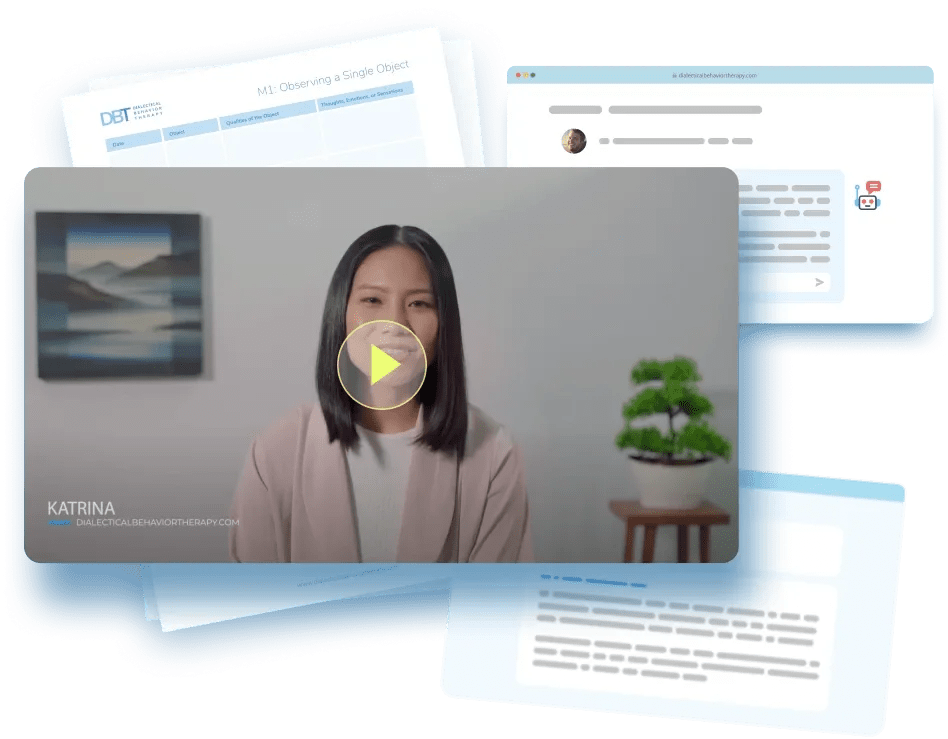Virtual Coach
Work step-by-step through the Emotion Regulation exercise with the virtual coach.
Introduction
Let’s face it: life feels a lot harder when you’re running on three hours of sleep, haven’t eaten anything but chips all day, and haven’t moved from the couch in six hours. Add in stress, rejection, or conflict, and suddenly it feels like your entire emotional system is on red alert.
This is where the ABC PLEASE skill comes in. It’s a foundational DBT skill from the emotional regulation module, and it’s all about taking care of the basics so your mind has a fair shot at handling the tough stuff.
When you’re constantly tired, sick, disconnected, or physically run down, your ability to regulate emotions drops. ABC PLEASE helps prevent emotional chaos by strengthening your baseline. This is what DBT calls “building mastery” and taking care of your physical vulnerability.
Let’s break it down.
What is ABC PLEASE?
A – Accumulate positive experiences
B – Build mastery
C – Cope ahead
PL – Treat Physical illness
E – Eat balanced meals
A – Avoid mood-altering substances
S – Sleep enough
E – Exercise regularly
You don’t need to do everything perfectly. But consistently applying even a few of these gives you more emotional resilience. Think of it as setting yourself up to win, on the days when life tries to throw everything at you.
ABC: Building a Solid Emotional Foundation
A – Accumulate Positive Experiences
Do things that create joy, satisfaction, and connection. This helps build a life that feels worth living.
Start small:
- Watch a funny video
- Hug a pet
- Text someone you like
- Listen to music you love
Take 15 minutes to do something fun on purpose
Also work on long-term goals: hobbies, relationships, and values-driven projects. Things that give life meaning.
B – Build Mastery
Do something that challenges you just enough to feel accomplished. Not so hard that you get discouraged, not so easy that it doesn’t matter.
Examples:
- Learn a new recipe
- Finish a task you’ve been avoiding
- Practice a skill or hobby
- Tidy up a space
This gives you a sense of control and progress, which directly fights feelings of helplessness.
C – Cope Ahead
Think about future situations that might be stressful, and rehearse how you'll handle them.
You can:
- Visualize the event going well
- Imagine using DBT skills during tough moments
- Practice calming statements in advance
Before a tough family dinner, you picture yourself using STOP and doing a half smile. Just imagining it helps you feel a little more in control before you even walk in.
PLEASE: Take Care of Your Body So It Supports Your Mind
PL – Treat Physical Illness
If you’re sick, injured, or ignoring a health issue, your mood and thinking will suffer. Take medication as prescribed. Rest. Go to the doctor if needed.
Your body isn’t separate from your mind. They work together.
E – Eat Balanced Meals
You don’t need a perfect diet. But try to avoid skipping meals or living on sugar and caffeine. Blood sugar crashes mimic emotional crashes.
Eat regularly, and eat foods that fuel, not deplete you.
A – Avoid Mood-Altering Substances
Alcohol, drugs, and even excessive caffeine or sugar can throw your emotional balance out of whack. Especially if you’re already vulnerable.
Check in with yourself: is what you’re consuming helping or harming your emotional stability?
S – Sleep Enough
Sleep affects everything. Focus, memory, emotion regulation, pain tolerance, stress response. Lack of sleep is a fast-track to emotional meltdowns.
Aim for a sleep schedule that works for your body. If that’s hard, start by setting a consistent bedtime or creating a wind-down routine.
E – Exercise Regularly
You don’t have to be a gym rat. Just move your body. Walk. Stretch. Dance. Clean the house while playing music. Movement reduces stress hormones and boosts feel-good chemicals like serotonin and dopamine.
Worksheets & Virtual Coach
Using ABC PLEASE
You don’t have to overhaul your whole life. Just ask yourself:
- Did I do at least one thing today to build joy?
- Did I challenge myself a little?
- Am I avoiding obvious stress triggers like lack of sleep or skipping meals?
When your body and brain are better taken care of, DBT skills like STOP, TIPP, and Wise Mind are easier to access.
FAQs
Why does DBT focus so much on physical health?
Because your brain is a physical organ. If your body’s out of balance, emotional regulation becomes ten times harder. ABC PLEASE keeps you from being extra vulnerable to emotional storms.
What if I don’t have energy to do any of this?
Start tiny. Even one minute of stretching. Or one glass of water. Or a 15 minute nap. Small actions add up! And they can help create the energy you need to keep going.
Isn’t this just basic self-care?
Yes, but with intention. In DBT, ABC PLEASE isn't fluffy wellness advice. It's targeted emotional stabilization. You’re laying down the foundation for stronger emotional skills.
What if I mess up or miss a day?
That’s okay. No skill is about being perfect. Just notice what made the day harder, and get back to basics the next day.
How does ABC PLEASE connect to emotion regulation?
It strengthens your foundation. Skills like Being Effective and Self-Validation feel more doable when you're not running on empty. That emotional muscles-up keeps everything else working better.
Disclaimer
If you have any behavioral health questions or concerns, please talk to your healthcare or mental health care provider. This article is supported by peer-reviewed research and information drawn from behavioral health societies and governmental agencies. However, it is not a substitute for professional behavioral health advice, diagnosis, or treatment.

